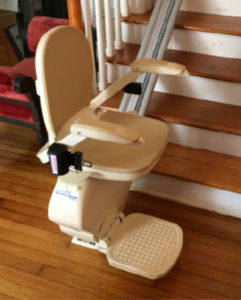According to the last census, around 10 million Americans have mobility issues related to walking or climbing. This was the most common disability cited.
As fate would have it, I am one of the 10 million Americans with mobility issues mentioned above. I’m not in a wheelchair yet but my leg strength and balance is definitely a problem. I used to think that stair chair lifts like the ones described in the Basement Guides Stair Chair Lift Guide were for old people. But not only is old age creeping up on me (I just turned 60) but my leg strength has been fading for awhile now. And I have to be honest with myself and admit that stairs have become a problem for me.

If I’m really being honest with myself, I have to admit that I’m not good at planning projects like a stair chair lift installation. I usually overlook something that costs me money when all is said and done. Fortunately for me, the Basement Guides Stair Chair Lift Guide does all the thinking for me
For example, at 6’6” I’m a little out-of-the-ordinary, height-wise. The Basement Guides alerts me to ask about this individual requirement. I’ll bet I need some sort of safety equipment- maybe a seatbelt or something…
THE KEY FACTORS THAT DETERMINE WHAT TYPE OF STAIRLIFT YOU SHOULD INSTALL ARE:
- Individual requirements
- Location requirments
- Budget requirements
Best of all, in my opinion anyway, is the Basement Guides section about cost. I can see what different options cost, I can see what a stair chair lift rental will cost and I can even buy a previously-owned stair chair lift will cost. I like knowing my opinions. I like having choices.
Because I have Medicare Advantage and because my need for a stair chair lift is because of a chronic condition, I may be able to get some of the cost of my stair chair lift costs covered. That sure sounds good to me.
Let me know if you have any questions.
Thanks,
David Emerson
- Cancer Survivor
- Director PeopleBeatingCancer
“Nearly 40 percent of people age 65 and older had at least one disability, according to a U.S. Census Bureau report that covered the period 2008 to 2012. Of those 15.7 million people, two-thirds of them say they had difficulty in walking or climbing…
Nearly 40 percent of people age 65 and older had at least one disability, according to a U.S. Census Bureau report that covered the period 2008 to 2012. Of those 15.7 million people, two-thirds of them say they had difficulty in walking or climbing.
Difficulty with independent living, such as visiting a doctor’s office or shopping, was the second-most cited disability, followed by serious difficulty in hearing, cognitive difficulty, difficulty bathing or dressing, and serious difficulty seeing.
While populous states such as California, Florida, New York and Texas had the largest number of older people with a disability, high disability rates were seen in Southern counties, especially in central Appalachia and the Mississippi Delta.
Older Americans With a Disability: 2008-2012, a report based on data collected during the American Community Survey, examines disability status by age, sex and selected socio-economic characteristics, such as marital status, living arrangement, educational attainment and poverty status…”



